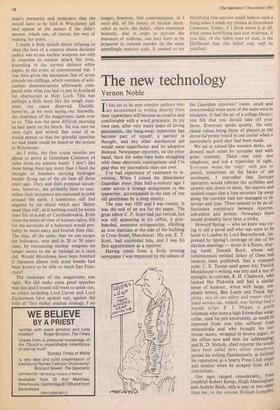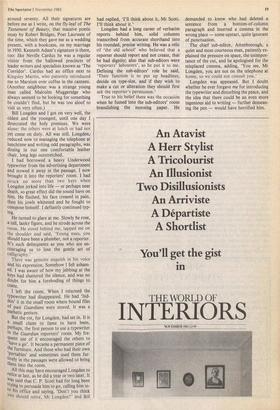The new technology
Vernon Noble
It has yet to be seen whether authors who are accustomed to writing directly from their typewriters will become as creative and comfortable with a word processor. In my own case, after very many years of loving association, the bang-away typewriter has become part of myself, a partner in thought, and any other mechanical aid would seem superfluous and its adoption disloyal. Newspaper reporters, on the other hand, have for some time been struggling with these electronic contraptions and I'm glad that my journalistic days are over.
I've had experience of resistance to in- vention. When I joined the Manchester Guardian more than half-a-century ago I came across a strange antagonism to the typewriter, accompanied in the case of one old gentleman by a deep enmity.
The year was 1929 and I was twenty. It was the end of an era for the paper. The great editor C. P. Scott had just retired, but was still appearing in his office, a grey- bearded, awesome octogenarian, climbing an iron staircase at the side of the building in Cross Street, Manchester. His son, E. T. Scott, had succeeded him, and I was his first appointment as a reporter.
Having come from a lively evening newspaper I was impressed by the silence of
the Guardian reporters' room, small and overcrowded when most of the team were in residence. It had the air of a college library: you felt that you should take off your shoes. Everyone spoke quietly, the only raised voices being those of players at the shove-ha'penny board in one corner when a particularly good shot had been made.
We sat at school-like wooden desks, ad- dressed each other by surname and with great courtesy. There was only one telephone, and not a typewriter in sight. Everyone wrote his 'copy' with Pen or pencil, sometimes on the backs of old envelopes. I marvelled that linotype operators would tolerate the scribbles and scrawls sent down to them, the reports and studied essays that a lone secretary far away along the corridor had not managed to in- tercept and type. There seemed to be an af- fectionate conspiracy between reporter, sub-editor and printer. Nowadays there would probably have been a strike.
Howard Spring — who we knew was try- ing to sell a novel and who was soon to be lured to London by Lord Beaverbrook, im- pressed by Spring's coverage of one of his election meetings — wrote in a fluent, slop- ing hand; Donald Boyd, whose war reminiscences entitled Salute of Guns had recently been published, had a cramped style; C. E. Turner used green ink; Patrick Monkhouse's writing was tiny and a test of eyesight; in contrast, R. H. Chadwick, who looked like Pickwick and had a similar sense of humour, wrote with large, em- phatic letters; Ben Leech and Frank Ap- pleby, two of our elders and expert short- hand writers (as, indeed, was Spring) had a boyish script; F. J. Hogan, a gentle Irishman who wore a high Edwardian wing- collar, used his pen uncertainly, as could be expected from one who suffered from melancholia and who brought his cut- throat razors, wrapped in brown paper, to the office now and then for safekeeping; and H. D. Nichols, chief reporter (he would have been called news editor elsewhere), spread his writing flamboyantly, as befitted his reputation as a hearty Press Club singer and drinker when he escaped from M.G• restrictions.
Our ages ranged considerably, from youthful Robert Kemp, Hugh Massingharli and Aubrey Rush, only a year or two older than me, to the veteran William Longden, around seventy. All their signatures are before me as 1 write, on the fly-leaf of The Testament of Beauty, that massive poetic essay by Robert Bridges, Poet Laureate of the time, which they gave me as a wedding present, with a bookcase, on my marriage in 1930. Kenneth Adam's signature is there, too: like Neville Cardus he was a regular visitor from the hallowed precincts of leader writers and specialists known as 'The Corridor'. Cardus had an office next to Kingsley Martin, who patiently introduced me to Marxism over coffee in the canteen. (Another neighbour was a strange young man called Malcolm Muggeridge who always seemed to be looking for something he couldn't find, but he was too aloof to visit us very often.) Bill Longden and I got on very well, the oldest and the youngest, until one day I desecrated the holy premises. We were alone: the others were at lunch or had not yet come on duty. All was still. Longden, reduced now to managing the telephone at lunchtime and writing odd paragraphs, was dozing in our one comfortable leather chair, long legs outstretched.
I had borrowed a heavy Underwood typewriter from the advertising department and stowed it away in the passage. I now brought it into the reporters' room. I had struck no more than two keys when Longden jerked into life — or perhaps near death, so great effect did the sound have on him. He flushed, his face creased in pain, then his jowls whitened and he fought to compose himself. I defiantly continued typ- ing.
He turned to glare at me. Slowly he rose, a tall, lanky figure, and he strode across the room. He stood behind me, tapped me on the shoulder and said, 'Young man, you should have been a plumber, not a reporter. It's such delinquents as you who are en- couraging us to lose the gentle art of calligraphy.'
There was genuine anguish in his voice and his expression. Somehow I felt asham- ed. I was aware of how my jabbing at the keys had shattered the silence, and was no doubt for him a foreboding of things to come, 1 left the room. When I returned the typewriter had disappeared. He had 'hid- den' it in the small room where bound files of past Guardians were stored. It was a Pathetic gesture.
But the rot, for Longden, had set in. It is a small claim to fame to have been, Perhaps, the first person to use a typewriter In the Guardian reporters' room. My fre- quent use of it encouraged the others to have a go'. It became a permanent piece of the furniture. And those who had their own portables' and sometimes used them fur- tively in the passages were allowed to bring them into the room.
All this may have encouraged Longden to retire at last, as he did a year or two later. It was said that C. P. Scott had for long been trying to persuade him to go, calling him in- to his office and saying, 'Don't you think YOU should retire, Mr Longden?' and Bill
had replied, 'I'll think about it, Mr Scott. I'll think about it.'
Longden had a long career of verbatim reports behind him, solid columns transcribed from accurate shorthand into his rounded, precise writing. He was a relic of 'the old school' who believed that a reporter should report and not create, that he had dignity; also that sub-editors were `reporters' labourers', as he put it to me. Defining the sub-editors' role he said, `Their function is to put up headlines, decide on type-size, and if they wish to make a cut or alteration they should first ask the reporter's permission.'
True to his belief there was the occasion when he fumed into the sub-editors' room brandishing the morning paper. He demanded to know who had deleted a sentence from a bottom-of-column paragraph and inserted a comma in the wrong place — some upstart, quite ignorant of punctuation.
The chief sub-editor, Attenborough, a quiet and most courteous man, patiently ex- plained the pressure on space, the unimpor- tance of the cut, and he apologised for the misplaced comma, adding, 'You see, Mr Longden, you are not on the telephone at home, so we could not consult you.'
Longden was appeased. But I doubt whether he ever forgave me for introducing the typewriter and disturbing the peace, and the idea that there could be an even more ingenious aid to writing — further demean- ing the pen — would have horrified him.















































 Previous page
Previous page